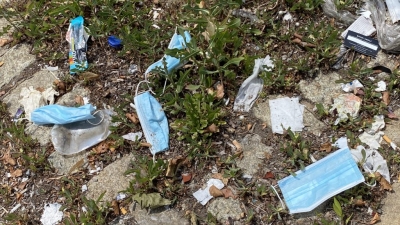
The COVID-19 pandemic is far from over. While healthcare workers, governments and people continue to fight the coronavirus, a new environmental problem has emerged and has been crying for attention – pandemic-related pollution, especially those concerning medical and plastic waste. The increased use of masks, gloves and PPE (Personal protective equipment) during the pandemic has resulted in them making their way into oceans and landfills. According to the UN Environment Programme (UNEP), around 75% of the used masks and other waste will end up in landfills, or seas. One study estimates that in the U.K. alone, if every person used a single-use face mask a day for a year, it would create an additional 66,000 tonnes of contaminated waste.
Plastic everywhere
The PPE includes respirators, masks, face shields, goggles, gowns, coveralls, and more. These are made of plastic and are mostly used only once before disposal. Such items take up to 500 years to degrade in the ocean. Similarly, gloves, commonly made from cheap and durable plastic such as polyvinyl chloride, take longer to degrade.
Cause for concern
The UNEP has warned the governments about the potential consequences of such waste. Open dumping of used masks, PPE and gloves, and their burning can not only lead to the release of toxins in the environment, but also to secondary transmission of diseases.
Environmentalists are urging governments to treat the medical and hazardous waste effectively. They insist on educating the public on the safe disposal of waste.
Innovation is key
Meanwhile, many plastic-free or reusable alternatives are being suggested worldwide to tackle the issue. A decontamination system that could instantly treat large quantities of PPE, masks and respirators, use of UV light to decontaminate used items and biodegradable gloves and face visors are being mooted.
Picture Credit : Google
